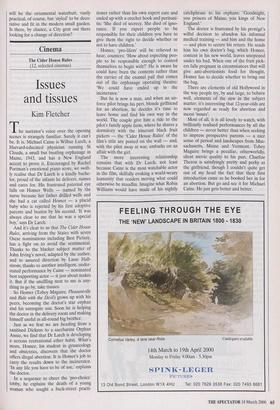Cinema
The Cider House Rules (12, selected cinemas)
Issues and tissues
Kim Fletcher
The narrator's voice over the opening scenes is strangely familiar. Surely it can't be. It is. Michael Caine is Wilbur Larch, a Harvard-educated physician running St Clouds, a small but bustling orphanage in Maine, 1943, and has a New England accent to prove it. Encouraged by Rachel Portman's emotional piano score, we swift- ly realise that Dr Larch is a kindly bache- lor, proud of the infants he delivers, names and cares for. His frustrated paternal eye falls on Homer Wells — named by the nurse because her father drilled wells and she had a cat called Homer — a placid baby who is rejected by his first adoptive parents and beaten by his second. 'It was always clear to me that he was a special boy,' says Dr Larch. And it's clear to us that The Cider House Rules, arriving from the States with seven Oscar nominations including Best Picture, has a fight on to avoid the sentimental. Thanks to the blacker subject matter of John Irving's novel, adapted by the author, and to assured direction by Lasse Hall- strom; thanks to another intelligent, under- stated performance by Caine — nominated best supporting actor — it just about makes it. But if the snuffling next to me is any- thing to go by, take tissues. So Homer (Tobey Maguire, Pleasantville and Ride with the Devil) grows up with his peers, becoming the doctor's star orphan and his surrogate son. Soon he is helping the doctor in the delivery room and making himself useful as all-round big brother.
Just as we fear we are heading from a sanitised Dickens to a saccharine Orphan Annie, we find that Dr Larch is developing a serious recreational ether habit. What's more, Homer, his student in gynaecology and obstetrics, discovers that the doctor offers illegal abortion. It is Homer's job to carry the results down to the incinerator. `In any life you have to be of use,' explains the doctor.
In a sequence to cheer the 'pro-choice' lobby, he explains the death of a young woman who sought a back-street practi- tioner rather than his own expert care and ended up with a crochet hook and peritoni- tis: 'She died of secrecy. She died of igno- rance. If you expect people to be responsible for their children you have to give them the right to decide whether or not to have children.'
Homer, 'pro-lifers' will be relieved to hear, counters: 'How about expecting peo- ple to be responsible enough to control themselves to begin with?' He is aware he could have been the contents rather than the carrier of the enamel pail that comes out of the orphanage operating theatre: `We could have ended up in the incinerator.'
But he is now a man, and when an air- force pilot brings his pert, blonde girlfriend for an abortion, he decides it's time to leave home and find his own way in the world. The couple give him a ride to the pilot's family apple farm, where he shares a dormitory with the itinerant black fruit pickers — the 'Cider House Rules' of the film's title are posted on the wall — and, with the pilot away at war, embarks on an affair with the girl. The more interesting relationship remains that with Dr Larch, not least because Caine is the most watchable actor in the film, skilfully evoking a world-weary humanity that renders moving what could otherwise be maudlin. Imagine what Robin Williams would have made of his nightly catchphrase to his orphans: 'Goodnight, you princes of Maine, you kings of New England.'
The doctor is frustrated by his protégé's wilful decision to abandon his informal medical training — and him and the home — and plots to secure his return. He sends him his own doctor's bag, which Homer, content in his new world, leaves unopened under his bed. When one of the fruit pick- ers falls pregnant in circumstances that will give anti-abortionists food for thought, Homer has to decide whether to bring out the bag.
There are elements of old Hollywood in the way people try, by and large, to behave well, elements of the new in the subject matter: it's interesting that 12-year-olds are now regarded as ready for abortion and incest 'issues'.
Most of all, it is all lovely to watch, with brilliantly realised performances by all the children — never better than when seeking to impress prospective parents — a nice sense of period and landscapes from Mas- sachusetts, Maine and Vermont. Tobey Maguire brings a peculiar, otherworldly, silent movie quality to his part. Charlize Theron is satisfyingly pretty and perky as the girlfriend, though I couldn't quite get out of my head the fact that their first introduction came as he booked her in for an abortion. But go and see it for Michael Caine. He just gets better and better.


















































































 Previous page
Previous page